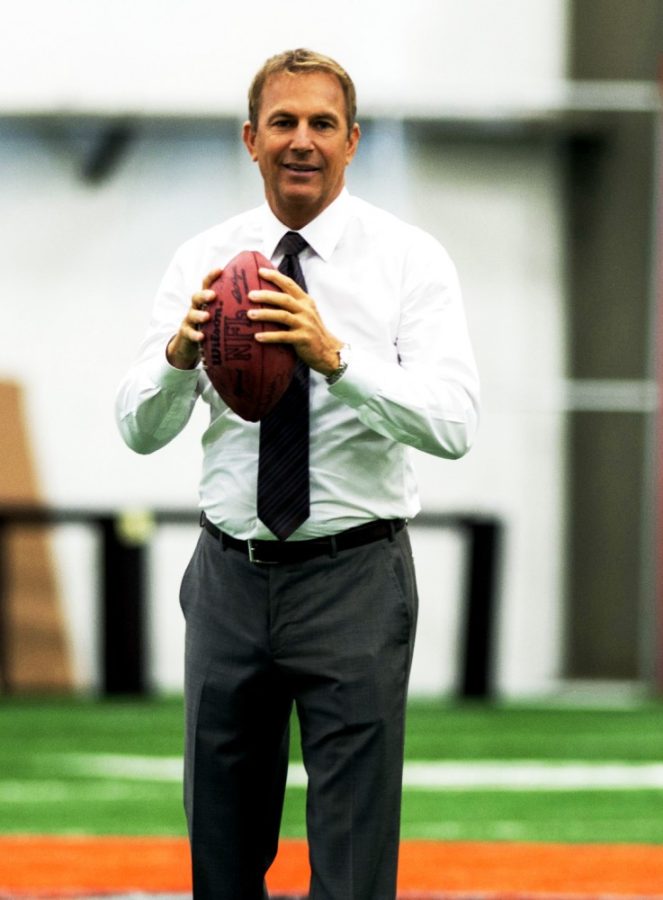The NFL draft is a drama-laden event that is tailor made for brave filmmakers. You have 32 big-money franchises led by decision makers, under considerable pressure, navigating a cutthroat business trying to improve their teams while simultaneously undercutting the competition. There are narratives to hit on among potential draftees, such as the monetary impact being drafted, or not drafted, has on a prospect with a less than ideal socioeconomic background.
“Draft Day” is a drama-comedy that hits on some of these themes, but is afraid to go the whole ten yards. Unlike “Moneyball,” the last great sports movie, “Draft Day” doesn’t stay true to the story it should be telling.
It attempts to tell the story of Cleveland Browns, fictitious, general manager Sonny Weaver Jr.,(Kevin Costner). “Draft Day” chronicles the 24 hours leading up to the start of the draft. It tries to do more than just show procedure. Beyond dealing with his embattled head coach and publicity hungry owner, Sonny has to also handle a secret relationship with his salary cap analyst Ali (Jennifer Garner) and the drama surrounding the recent death of his father. Sonny has a lot on his plate, and it proves to be too much for the movie.
“Draft Day” is at its best when dealing with the draft itself, and everything that goes into it. The movie gets off to a good start and builds early momentum, before veering off-course with nonsense. It’s inconsistent; parts of it work and parts of it drag. Late in the movie, it finally hones in on just the draft and the decisions Sonny has to make. The movie-goer wishes it had been there the entire time.
Its biggest burden is the relationship between Costner and Garner. It’s predictable and cliché and completely unnecessary. There are other, better ways to explore the romantic psychology of a character. For instance, “Moneyball” brilliantly navigated the romantic side of Billy Beane (Brad Pitt) through not only his love of the game, but also through his relationships with his ex-wife and daughter. By contrast, “Draft Day” forces the romance between its two biggest stars, but it would’ve been better without it.
At one point, just as it seems to settle into its main storyline, Costner pulls Garner into a storage closet for the second time. “Again?” she asks with a sigh. The viewer probably feels the same way.
“Draft Day” was created in conjunction with the NFL, which works both for and against the film. On the positive side, the on-site scenes at the NFL draft look amazing. The filmmaker actually shot scenes at last year’s draft, so the atmosphere there is incredibly realistic.
“Draft Day” also features real-life football analysts and talking heads, such as Chris Berman, Jon Gruden and Mel Kiper Jr. Even the most casual of football fans recognize these figures, which gives the movie some much-needed credibility.
Director Ivan Reitman, known for “Ghostbusters,” has said he wouldn’t have done the movie had they been unable to use the NFL’s branding and logos.
“It was a remarkable opportunity, and frankly, this movie wouldn’t have been made without it,” Reitman said. “There was no way to tell the story with a made-up group of teams and league. It just wasn’t going to happen — I wasn’t interested in it as a filmmaker, and the studio wouldn’t have made it.”
However, working with the NFL does have its negatives. For one, “Draft Day” feels like one big advertisement for the league, its sponsors and ESPN. The studio and Reitman also had to run the script by the league for approval. It’s unknown how much was changed — Reitman said “not much” — but it’s unlikely the league would’ve allowed Reitman much room to create. It’s in the league’s best interest that this be a feel-good commercialized film, something “Moneyball” was not.
But the movie is not terrible, thanks mainly to its star. Costner is quite possibly the most prolific sports movie actor of all time, racking up stellar performances in “Bull Durham,” “Field of Dreams” and “Tin Cup.” Add “Draft Day” to that list. His innate ability to look cool under pressure fits this role perfectly, as he spends much of the movie on the phone making big decisions. As always, he strikes a near perfect comedic tone, making the writing much funnier than it actually is. This looks so natural for him, like he’s freestyling these scenes without a script, but he’s not. He’s essentially playing the football version of his typical character.









